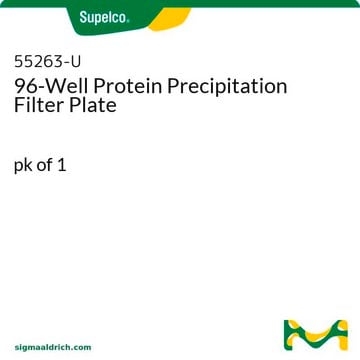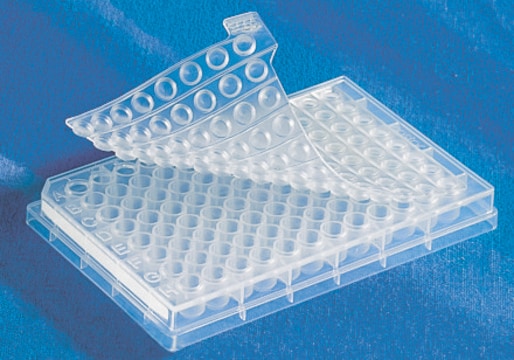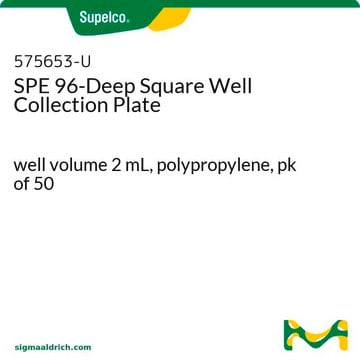575673-U
HybridSPE®-PLus 96-Well solid phase extraction (SPE) Plate
Volume 2 mL, bed wt., 50 mg, pk of 20 ea
Synonym(s):
HybridSPE®-PLus
About This Item
Recommended Products
Product Name
HybridSPE®-PLus 96-Well Plate, volume 2 mL, pk of 20 ea
description
96-well Plate
Quality Level
product line
HybridSPE®
composition
bed wt., 50 mg
packaging
pk of 20 ea
technique(s)
solid phase extraction (SPE): suitable
volume
2 mL
matrix active group
zirconia-based phase
Looking for similar products? Visit Product Comparison Guide
General description
Our HybridSPE-PLus products offer the same time-proven chemistry of our traditional HybridSPE-Phospholipid products coupled with manufacturing enhancements that stem from years of production experience. These manufacturing enhancements have allowed us to increase flow consistency and reduce sample hold up volumes, further improving analyte recoveries and assay reproducibility. We invite customers to take advantage of the newest technology; HybridSPE-PLus.
Application
- Development of a High-Throughput Analytical Method for Antimicrobials in Wastewater Using an Automated Pipetting and Solid-Phase Extraction System: This study highlights the utilization of HybridSPE®-PLus 96-Well Plates for environmental analyte testing in wastewater. The method incorporates high-throughput sample preparation and solid phase extraction to efficiently process large sample volumes, proving essential for monitoring pharmaceutical pollutants and ensuring environmental safety (Azuma et al., 2024).
- High-throughput DNA extraction and cost-effective miniaturized metagenome and amplicon library preparation of soil samples for DNA sequencing: This research utilizes HybridSPE®-PLus 96-Well Plates to streamline the preparation of soil sample libraries for high-throughput sequencing. The method emphasizes cost-efficiency and rapid processing, suitable for extensive environmental and biological studies, reflecting the plate′s versatility in sample preparation (Jensen et al., 2024).
- Solvent-free parallel artificial liquid membrane extraction for drugs of abuse in plasma samples using LC-MS/MS: The HybridSPE®-PLus 96-Well Plate is employed for innovative LC-MS/MS sample cleanup in the detection of drugs in plasma. This application underscores the plate′s capacity for enhancing analytical performance in forensic and clinical toxicology by providing a robust, reproducible method for drug testing (Fabris et al., 2024).
- High-throughput sequencing of insect specimens with sub-optimal DNA preservation using a practical, plate-based Illumina-compatible Tn5 transposase library preparation method: In this study, HybridSPE®-PLus 96-Well Plates facilitate high-throughput DNA extraction and sequencing of insect specimens. This highlights the plate′s crucial role in genomic research, particularly in the study of biodiversity and conservation biology, where rapid and efficient DNA analysis is required (Cobb et al., 2024).
- Simultaneous determination of twelve neonicotinoids and six metabolites in human urine with isotope-dilution UPLC-Q-Orbitrap HRMS: This publication details the use of HybridSPE®-PLus 96-Well Plates in a sophisticated chromatographic setup for the quantitative analysis of pesticides in biological samples. The method demonstrates the plates′ effectiveness in environmental and health-related studies, ensuring precise measurement and monitoring of hazardous substances (Zhang et al., 2024).
Features and Benefits
- Simple 2-3 step standard methodology analogous to traditional protein precipitation provides simultaneous removal of both proteins and phospholipids
- Unique Lewis acid/base retention mechanism effectively removes phospholipids from both hydrophilic and hydrophobic analytes of interest (unlike competitive chemistries) eliminating phospholipid-induced ion suppression
- Highly reproducible, consistent product performance
- Provides cleaner samples for longer column life and less instrument downtime
- Available in 96-well and 1 mL cartridge dimensions
Legal Information
Not finding the right product?
Try our Product Selector Tool.
Storage Class Code
11 - Combustible Solids
WGK
WGK 3
Flash Point(F)
Not applicable
Flash Point(C)
Not applicable
Choose from one of the most recent versions:
Already Own This Product?
Find documentation for the products that you have recently purchased in the Document Library.
Customers Also Viewed
Articles
This article highlights the impact that sample matrix effects can have on LC/MS response and discusses two novel approaches to reduce it.
Protocols
Immunoassay-based methods for digitoxin or digoxin exist, but are time consuming, labor intensive, and not selective due to similarities in their chemical structures.
Immunoassay-based methods for digitoxin or digoxin exist, but are time consuming, labor intensive, and not selective due to similarities in their chemical structures.
Immunoassay-based methods for digitoxin or digoxin exist, but are time consuming, labor intensive, and not selective due to similarities in their chemical structures.
Immunoassay-based methods for digitoxin or digoxin exist, but are time consuming, labor intensive, and not selective due to similarities in their chemical structures.
Our team of scientists has experience in all areas of research including Life Science, Material Science, Chemical Synthesis, Chromatography, Analytical and many others.
Contact Technical Service







